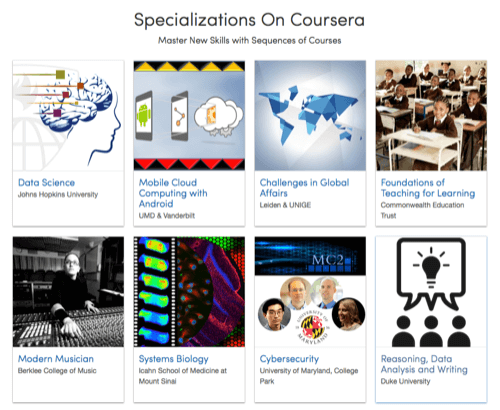
This post is part of Hire Education, an occasional series about technological innovation in education and how it’s reshaping the way students prepare themselves for a transformed workforce.
I’m currently enrolled in a free online Coursera class on terrorism through a university located in the Netherlands, in which I watch lectures and complete assignments from the comfort of my couch. As much as I enjoy the subject matter, though, completing the course in a timely fashion while maintaining a work-life balance has proven challenging.
I almost gave it up.
Instead of quitting altogether, I paid Coursera $49 to give me a “completion certificate” so I’ll have a reward when I complete the course. Putting actual money on the line turned out to be all the incentive I needed to keep going.
Online education services like Udacity and Coursera bank on students like me to drive them to success. And if recent online course offerings are any indication, this year we might start to see a trend towards legitimacy and profitability that proves open education has staying power among the multitasking masses.
2013 proved to be a banner year for online education. Massive open online courses, sometimes called MOOCs, surged in popularity, due to advanced offerings and a promise to make university-level education accessible. But these companies also faced considerable scrutiny.
In attempting to disrupt traditional education and become a standard of online learning, MOOCs suffered very low retention and completion rates as well as skepticism surrounding their business models. Coursera, one of the most popular online education companies, averaged a retention rate of just four percent across all courses, according to Coursera cofounder Daphne Koller.
It appears education companies are ready to tackle low retention rates and carve out their niches in academia. With a few subtle changes, these startups could prove to the naysayers that online education is not only affordable, but also attractive to students and employers alike.
A Move To Legitimize
Coursera recently introduced “specialization certificates,” which awards students with certificates once they master a sequence of courses on a specific topic and complete a capstone (a.k.a. “senior”) project.
In an interview with ReadWrite, Andrew Ng, cofounder and co-CEO of Coursera, said the goal of specialization certificates is to provide more meaningful credentials by putting together a full course of study.
Initially, the specialization certificate courses will focus on areas where jobs are in high-demand and could help students secure employment opportunities. For instance, a specialization in data science offered by Johns Hopkins University consists of nine courses, and a Virtual Teacher Program with the University of California at Irvine can be completed in just four courses.
In order to achieve a specialization certificate, students must pay a fee per course to receive verified certificates, which Ng says will drastically improve completion rates.
See Also: Udacity Ignores Reality, Founds Open Education Alliance
“We do believe doing a capstone project and earning a specialization certificate will provide greater incentive and motivation for students to complete,” he said.
In initial user tests surrounding the proposed specialization certificate program, Coursera found that introducing a capstone project increased students’ interest in completing the series of courses by 50 percent.
With Coursera, students can take a course for free, or pay anywhere from $49 to $100 for a verified certificate through its Signature Track program. Ng said the completion rate for students who paid for courses to earn verified certificates was 63%—considerably higher than the average completion rate.
The majority of courses on Coursera and other online education services can be taken for free, though paid tiers offer more in-depth study, and in Coursera’s case, a more legitimate completion certificate.
On Udacity, another MOOC website, non-paying students have access to course videos and exercises and can view and manage their progress, but a paid subscription gives them access to in-class projects, feedback from instructors and a verified certificate.
Udacity takes a different approach to providing students with desirable classes or skills: The company teamed up with corporations including Cloudera and Salesforce to create industry-specific classes that allow students to achieve certificates recognized by the Open Education Alliance, a partnership between leading technology companies to further the education and adoption of technical skills.
Don’t Call It A Major

When comparing a traditional college education to online-only programs, the new specialization certificates could be considered Coursera’s version of a degree. But Ng said that’s not the way it was intended.
“Seventy-five percent of Coursera students today already have a degree,” he said. “We hope to see that these will be a complement to a degree.”
While Coursera is making a distinction between its services and brick-and-mortar universities, Udacity, Georgia Tech, and AT&T have jointly developed an online master’s degree in computer science that gives students an accredited university degree online for 20% less than on-campus tuition.
The world’s first massive online degree program started on January 15; nearly 2,400 people applied for the program, but only 375 students were accepted.
This isn’t Udacity’s first attempt to make its courses available to university students for credit. Last year, the company offered three online math classes to students at San Jose State University, but more students failed the online classes than students who took those courses in traditional settings.
Udacity is trying again with Georgia Tech. Depending on how well the program does, it could pave the way for more universities to partner with MOOCs and provide less-expensive degree programs to a larger audience.
The Tune Has Changed
Initially, founders of the MOOC movement—as well as proponents for free and open online education—heralded their creations as the next great education disrupter, a way for people who can’t go to college to attain an inexpensive education.
Sebastian Thrun, founder of Udacity, a well-known Stanford academic and founder of the secretive Google X research lab, largely ignored the initial statistics that proved a free, open online education might not be the future of learning after all. In some instances, Udacity courses have up to a 90% drop out rate, but that didn’t stop the charismatic founder from touting the platform’s successes.
Thrun has since admitted he may have been wrong. In a recent interview for Fast Company, he said Udacity may not be fulfilling the goal of a complete education experience. He also said he doesn’t even like the term “MOOC.”
We were on the front pages of newspapers and magazines, and at the same time, I was realizing, we don’t educate people as others wished, or as I wished. We have a lousy product.
Students echo similar opinions.
Nathan Winn, a sales account manager in San Francisco, has signed up for and not completed three Coursera classes. Winn told me he thought the courses were interesting, but didn’t provide the enrichment he was looking for.
Instead, he took a $600 course through Berkeley Extension, a continuing education branch of the University of California at Berkeley.
He said relying on the resources at Cal and investing a large sum of money encouraged him to complete the course. “It was expensive, but because I put that much money into it, I totally completed it.”
An Education Will Cost Money, Perhaps Just Not As Much
Open online educational companies are still experimenting to find the perfect model—one that benefits students, educators and the companies alike.
Legitimacy costs money. It’s why traditional colleges and universities often charge exorbitant sums so you can receive a diploma with the institution’s name on it.
If the recent efforts from Coursera and Udacity are any indication, a completely free education and certification will never be available, but as the price of admission increases, so might the promise of a complete, and authentic, online education.
Lead image via HackNY on Flickr

















